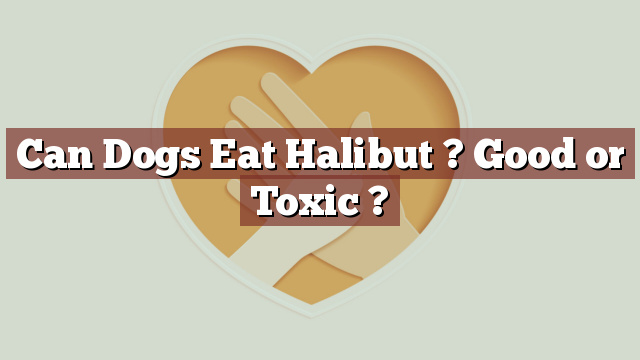Can Dogs Eat Halibut? Good or Toxic?
Knowing what foods are safe for our pets is crucial for their overall health and well-being. One common question that often arises is whether dogs can safely consume halibut, a type of fish known for its mild flavor and delicate texture. In this article, we will explore the nutritional value of halibut, discuss its safety for dogs, and provide guidance on what to do if your furry friend consumes this fish.
Nutritional Value of Halibut: Vitamins, Minerals, and Proteins
Halibut is a nutrient-rich fish that offers several important vitamins, minerals, and proteins. It is an excellent source of lean protein, which is essential for the growth and maintenance of muscles in dogs. Additionally, halibut contains omega-3 fatty acids, which have been linked to numerous health benefits, including improved heart health and reduced inflammation. This fish also provides essential minerals such as potassium, magnesium, and selenium, as well as vitamins B6, B12, and D.
Can Dogs Eat Halibut? Safety and Toxicity Considerations
Can dogs eat halibut? Yes, they can. Halibut is generally safe for dogs to consume in moderation and when properly cooked. However, it is important to note that certain precautions should be taken. Raw or undercooked halibut can pose a risk of bacterial contamination, such as salmonella or listeria, which can cause gastrointestinal upset in dogs. Therefore, it is crucial to ensure that the halibut is cooked thoroughly before offering it to your furry friend.
Potential Risks and Benefits of Feeding Halibut to Dogs
Feeding halibut to dogs can have both potential risks and benefits. On the positive side, the omega-3 fatty acids present in halibut can contribute to a healthy coat and skin, as well as improve joint health and reduce the risk of certain inflammatory conditions. However, it is important to consider the overall balance of your dog’s diet. While halibut can be a nutritious addition, it should not replace a well-balanced diet consisting primarily of a high-quality dog food.
On the other hand, there are potential risks associated with feeding halibut to dogs. As previously mentioned, the consumption of raw or undercooked halibut can lead to bacterial infections. Additionally, some dogs may be allergic to fish or certain proteins found in halibut. If you notice any signs of an allergic reaction, such as itching, swelling, or difficulty breathing, discontinue feeding halibut and consult your veterinarian.
What to Do If Your Dog Eats Halibut: Signs, Treatment, and Prevention
If your dog consumes halibut, it is important to monitor their behavior and watch for any signs of digestive upset. Symptoms may include vomiting, diarrhea, decreased appetite, or lethargy. In the case of mild symptoms, it is recommended to provide your dog with plenty of fresh water and a bland diet until their stomach settles. However, if your dog displays severe symptoms or if you suspect food poisoning, it is crucial to seek veterinary assistance promptly.
To prevent any potential risks associated with halibut consumption, it is advised to introduce this fish gradually into your dog’s diet. Start with small portions and observe how your dog reacts to it. Additionally, always ensure that the halibut is thoroughly cooked, free from any seasonings, bones, or other potential choking hazards.
Conclusion: Moderation and Consultation with a Veterinarian is Key
In conclusion, dogs can safely consume halibut as long as it is properly cooked and given in moderation. The nutritional value of halibut, including its protein, omega-3 fatty acids, vitamins, and minerals, can offer several health benefits to our canine companions. However, it is important to be aware of the potential risks, such as bacterial contamination and allergic reactions, and to consult a veterinarian if you have any concerns or questions regarding your dog’s diet.
Remember, maintaining a balanced and nutritious diet for your dog is essential for their overall health. While halibut can be a healthy addition to their meals, it should not replace a complete and balanced dog food. By practicing moderation and seeking professional guidance, you can ensure that your furry friend stays happy, healthy, and well-nourished.
Thank you for investing your time in exploring [page_title] on Can-Eat.org. Our goal is to provide readers like you with thorough and reliable information about various dietary topics. Each article, including [page_title], stems from diligent research and a passion for understanding the nuances of our food choices. We believe that knowledge is a vital step towards making informed and healthy decisions. However, while "[page_title]" sheds light on its specific topic, it's crucial to remember that everyone's body reacts differently to foods and dietary changes. What might be beneficial for one person could have different effects on another. Before you consider integrating suggestions or insights from "[page_title]" into your diet, it's always wise to consult with a nutritionist or healthcare professional. Their specialized knowledge ensures that you're making choices best suited to your individual health needs. As you navigate [page_title], be mindful of potential allergies, intolerances, or unique dietary requirements you may have. No singular article can capture the vast diversity of human health, and individualized guidance is invaluable. The content provided in [page_title] serves as a general guide. It is not, by any means, a substitute for personalized medical or nutritional advice. Your health should always be the top priority, and professional guidance is the best path forward. In your journey towards a balanced and nutritious lifestyle, we hope that [page_title] serves as a helpful stepping stone. Remember, informed decisions lead to healthier outcomes. Thank you for trusting Can-Eat.org. Continue exploring, learning, and prioritizing your health. Cheers to a well-informed and healthier future!

